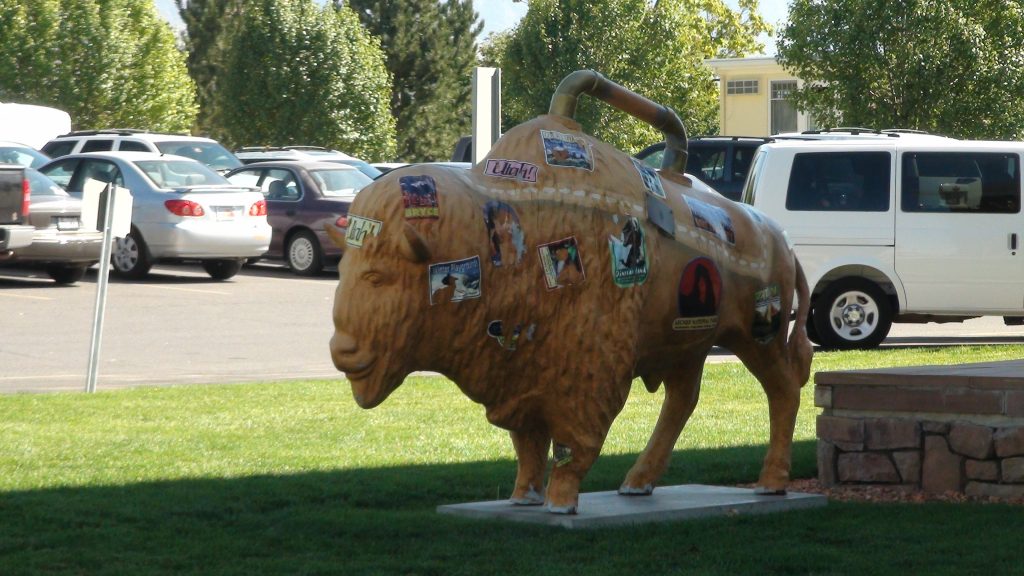Buffalo thingy. Utah Capitol.
Sunday, 21 August 2022
But it happened in those days that she became sick and died. When they had washed her, they laid her in an upper room. Acts 9:37
Note: You can listen to today’s commentary courtesy of our friends at “Bible in Ten” podcast. (Click Here to listen).
You can also read this commentary, with music, courtesy of our friends at “Discern the Bible” on YouTube. (Click Here to listen), or at Rumble (Click Here to listen).
The verse now is speaking of Tabitha (Dorcas) of the previous verse. It noted that she was full of good works and charitable deeds. Luke now continues with, “But it happened in those days.”
Without going ahead, “those days” means that it was during the time that Peter was in the vicinity. The narrative was focused on him and Aeneas. What is happening now is to be assumed (and later made explicit) that this is during that time period “that she became sick.”
Luke, a physician, doesn’t give any specifics. This shows that no determination was made how this happened. Otherwise, he would have given his usual careful observations. Rather, he gives the main point that some malady had overtaken her. She was “sick and died.”
Her death is given as a recorded fact. There is no reason to assume anything other than this occurred. Those who argue that this was a swoon or the like do so against the plainly stated facts. Further, to argue for this when they were not present is to argue that the account is factual and simply needs to be tweaked to allow for their own presuppositions and biases concerning the matter.
Further, it is the height of arrogance to make a claim about the narrative that is contrary to what is plainly stated when they were not there. Being dead is a state that is not hard to determine, and people have identified it for all of human history. If there are exceptions where a misdiagnosis was made, the burden of proof is on the one making the claim to prove it. As this cannot be done, the record of her death must stand as it is written. With that in mind, it next says, “When they had washed her.”
This was a traditional part of the burial process. It is a demonstration of care and respect for the person’s memory as she is prepared for her final internment. Matthew Poole says, “They washed the dead, and anointed them, to fit them for their burying, and especially to show their hope of the resurrection; which some think St. Paul alludes unto, 1 Corinthians 15:29.”
This is actually an important point. Matthew Poole’s note about anointing the dead is correct, but nothing is said of that here. It is actually a clue that they have a hope that has not yet been expressed in the account. That will be seen in the coming verses.
People tend to the corpses of their dead all over the world. It may be there is a sense of hope in an afterlife (such as the Egyptians) or for some other reason but including 1 Corinthians 15:29 is not correct. That is not at all the intent of Paul’s words. He clearly says in the same passage “that flesh and blood cannot inherit the kingdom of God; nor does corruption inherit incorruption” (1 Corinthians 15:50).
The bodies that believers now possess are destined to return to the dust of the earth, just as the early Genesis account tells us. When Daniel was told that many of those who sleep in the dust will be raised, it confirms this. The bodies that we now possess will not be the bodies we will possess at the resurrection. The washing of Tabitha was a note of respect and a point of closure for those left behind. With that noted, the verse ends with “they laid her in an upper room.”
This would be out of sight of any who came by the house except for those who would purposefully go up to view her one last time. The custom in the Middle East was to always bury a person as quickly as possible, usually within the same day. Any chance to pay one’s last respects would have to come within that short timeframe.
Life application: Unless the rapture happens, we are all going to die physically. This is a part of the way things are at this time. There is not a moment of guarantee that when we wake up in the morning, we will be alive by evening. And there is no guarantee that going to bed will be followed by getting up the next morning.
We must be prepared, right now, to meet our Maker. As Jesus is the One who makes reconciliation with Him possible, it is our responsibility to receive His offer of peace and reconciliation now. And more, it is our responsibility to tell others about what God has offered. Our date with death’s destiny is assured. When it will come is known to God alone. Let us be wise and be prepared for that day and let us prepare others – as best as we can – for that day as well.
Lord God, thank You that because of Jesus Christ, we have the sure, certain, and blessed promise of the resurrection to eternal life that You have promised to all those who believe. May we be responsible to tell others about this joy that we possess while we have the time. Prompt us in this, O God. Amen.

